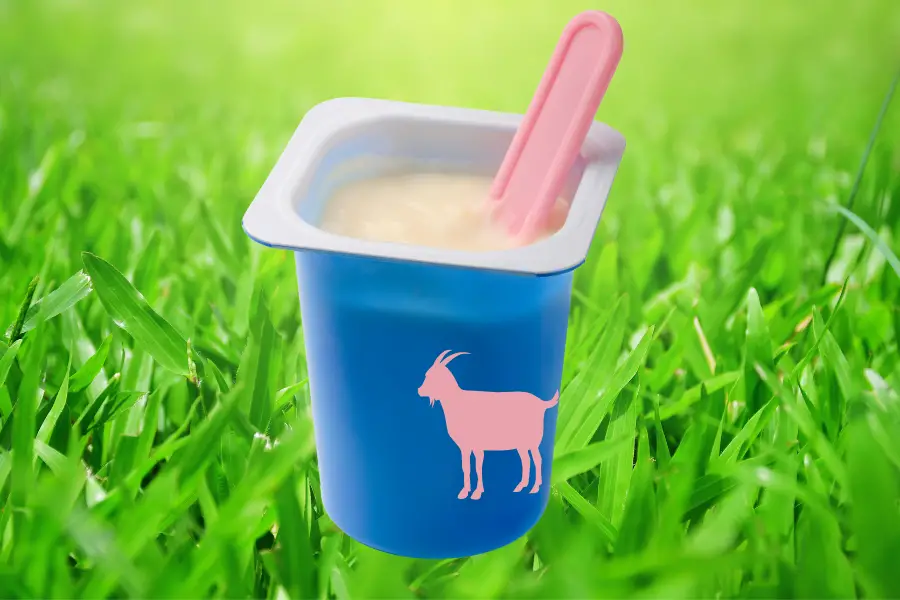
Goat milk yogurt has been gaining popularity as a nutritious and delicious alternative to cow’s milk yogurt. Made from the milk of goats, this type of yogurt is known for its tangy, creamy taste and its rich, velvety texture. One of the reasons for its growing popularity is its range of health benefits, as well as its suitability for individuals with lactose intolerance.
Table of contents
Goat Milk Yogurt is Nutritious
Loaded with essential nutrients, goat milk yogurt boasts an impressive profile of vitamins, minerals, and healthy bacteria that support optimal digestion and immunity. Moreover, the smaller fat globules in goat milk are easier for the body to break down and digest compared to those found in cow’s milk, making it an ideal choice for those experiencing lactose intolerance or digestive issues.
Key Takeaways
- Goat milk yogurt is a creamy, nutritious alternative with a tangy flavor
- It is suitable for individuals with lactose intolerance or digestive issues
- Goat milk yogurt offers an impressive blend of vitamins, minerals, and healthy bacteria for optimal health
What Is Goat Milk Yogurt
Goat milk yogurt is a type of yogurt made from the milk of goats, offering a tasty and nutritious alternative to cow milk yogurt. It has gained popularity for its rich, creamy texture and unique tangy taste.
Cow Milk Vs Goat Milk
Goat milk has a different composition than cow milk, which contributes to the distinctive qualities of goat milk yogurt. Compared to cow milk, goat milk:
- Contains smaller fat globules, making it easier to digest for some people
- Has a higher concentration of medium-chain fatty acids, which are known to be beneficial for metabolism
- Is naturally homogenized due to its smaller fat globules, so it does not separate easily
However, some people may find the taste of goat milk slightly stronger and tangier compared to cow milk.
Nutrition Facts
Goat milk yogurt is packed with essential nutrients, vitamins, and minerals. per 100 grams, it typically has:
- Calories: 69 kcal
- Protein: 4.3 g
- Carbohydrates: 4.4 g
- Fat: 4.1 g
- Calcium: 133 mg
- Potassium: 155 mg
- Phosphorus: 105 mg
It is relatively high in calcium and phosphorus, two minerals essential for maintaining strong bones and teeth. Additionally, goat milk yogurt is a good source of probiotics, promoting a healthy gut flora.
Types of Goat Milk Yogurt
There are several types of goat milk yogurt available in the market. Three popular options include:
- Plain goat milk yogurt: This type is made from pure goat milk and has the natural tangy and creamy taste that is characteristic of goat milk. It can be consumed as is or used in smoothies, dressings, and various recipes.
- Greek-style goat milk yogurt: This type is thicker and creamier than plain goat milk yogurt, made by straining out the whey. Greek-style goat milk yogurt works well as a substitute for sour cream or crème fraîche in recipes.
- Flavored goat milk yogurt: For those who prefer a sweeter taste, there are various fruit-flavored goat milk yogurts available. These versions usually have added sweeteners, fruit purees, or fruit-on-the-bottom to provide a flavorful twist.
Health Benefits and Nutrients

Probiotics and Fermentation
Goat milk yogurt is a natural source of probiotics due to the fermentation process it undergoes. Probiotics are live microorganisms that can benefit the digestive system, helping to maintain a balance of healthy gut bacteria. Fermented foods, like goat milk yogurt, also aid digestion and can support immunity.
Vitamins and Minerals
Goat milk yogurt contains essential vitamins and minerals. Some of the notable nutrients present in goat milk yogurt include:
- Calcium: Required for strong bones and teeth
- Phosphorus: Works together with calcium to support bone health
- Potassium: Helps control blood pressure and balance fluids in the body
- Magnesium: Supports a healthy nerve function and regulation of muscle contractions
- Vitamin A: Contributes to healthy skin, vision, and immune system
Lactose Intolerance and Allergies
People with lactose intolerance may find goat milk yogurt easier to digest than traditional cow’s milk yogurt. Goat milk typically has lower lactose levels, which can reduce symptoms like bloating and abdominal pain. Additionally, goat milk contains slightly different protein structures than cow’s milk, which may result in fewer allergic reactions for some people.
Heart Health
Goat milk yogurt can play a beneficial role in heart health. Although it contains similar fat content to cow’s milk yogurt, goat milk has a higher proportion of medium-chain fatty acids, which are easier for the body to break down and utilize. These fatty acids, along with potassium and magnesium present in goat milk yogurt, can help regulate blood pressure and support overall cardiovascular health.
Making Goat Milk Yogurt
Homemade Yogurt
Making goat milk yogurt at home is a simple process, requiring only a few ingredients and some patience. To begin, you will need:
- 1 quart of fresh goat milk
- 3 tablespoons of yogurt starter
- Optional: 1 tablespoon gelatin or pectin (to thicken)
First, warm the goat milk to 110°F (43°C), being careful not to overheat it. If using gelatin or pectin, whisk it into the warmed milk until dissolved. Cool the milk to approximately 95°F (35°C) before adding the yogurt starter.
Choosing a Yogurt Starter
Selecting a high-quality yogurt starter is crucial for successful homemade goat milk yogurt. Look for starters containing beneficial bacteria such as:
- S. thermophilus
- Bifidobacterium lactis
These bacteria help ferment the milk and give yogurt its characteristic taste and texture. You can find yogurt starters in health food stores or online.
Using a Yogurt Maker
A yogurt maker can simplify the process and provide consistent results. To use one, simply follow these steps:
-
Combine Milk and Starter Mixture
Pour the prepared milk and starter mixture into the recommended containers of the yogurt maker.
-
Ferment
Set the yogurt maker’s temperature to 110°F (43°C) and timer for 8-12 hours, depending on your desired yogurt consistency. The longer it ferments, the thicker and tangier the yogurt will become.
-
Store
After fermentation, transfer the yogurt to an airtight container and refrigerate for at least 4 hours before consuming. This allows the yogurt to set and develop its texture.
Using raw milk in your recipe may produce a thinner yogurt, so experiment with fermentation times or additional thickeners to achieve your preferred consistency. Enjoy your homemade goat milk yogurt in recipes or on its own as a nutritious and tasty treat.
Goat Milk Dairy Products
Goat milk is a highly nutritious and healthy alternative to cow milk. It contains various essential nutrients and is often easier to digest, making it an ideal choice for individuals with lactose intolerance. Goat milk dairy products have gained popularity in recent years due to their unique taste and health benefits. In addition to yogurt, cheese and kefir are also commonly made from goat milk.
Cheese
Goat milk cheese is known for its distinct flavor and soft texture. There are several types of goat cheeses available in the market, with some of the well-known varieties including:
- Chèvre: A fresh, soft cheese with a tangy, lemony flavor.
- Feta: A brined, crumbly cheese with a salty and slightly tangy taste.
- Gouda: A semi-hard cheese with a mild, nutty flavor.
Goat cheeses are rich in protein, calcium, and beneficial fatty acids, making them a healthy addition to a balanced diet. They can be enjoyed in various dishes or on their own as a delicious snack.
Kefir
Kefir is a fermented milk drink made from goat milk. It is produced by fermenting milk with kefir grains, which are a combination of yeast and bacteria. The fermentation process results in a tangy, effervescent drink that is high in probiotics, vitamins, and minerals.
Goat milk kefir offers several health benefits, such as:
- Improving gut health: The probiotics in kefir can help maintain a healthy balance of bacteria in the digestive system, promoting overall gut health.
- Boosting the immune system: Kefir contains various nutrients, like vitamins A and D, that can support a healthy immune system.
- Easier digestion: Goat milk kefir is easier to digest than cow’s milk kefir, making it a suitable choice for those with lactose intolerance.
Both goat milk cheese and kefir are tasty and healthy alternatives to traditional cow milk dairy products. Incorporating them into your diet can add variety and benefit your overall health.
Additional Goat Milk Applications
Alternative Milk Options
Goat milk yogurt is not the only alternative milk product available. Almond milk is another popular choice for those seeking a non-dairy option. Both goat milk and almond milk can be used in a variety of applications, such as smoothies, baking, and as a substitute for cow’s milk in many recipes.
Sauces and Dressings
Goat milk can be used to make flavorful sauces and dressings. Incorporating organic goat milk into traditional recipes adds a unique twist to common dishes. Some examples include:
- Creamy Alfredo sauce made with goat milk, garlic, and Parmesan cheese
- Tangy goat milk ranch dressing with fresh herbs
- Goat milk-based béchamel sauce for lasagna
- Goat Milk Caramel Sauce – delicious on ice cream
Soaps and Cosmetics
Goat milk is not just a tasty food ingredient; it’s also beneficial for skin care. Goat milk-based soaps and cosmetics provide a natural and artisan alternative to traditional skin care products:
- Goat milk soap: nourishing and gentle on the skin, often combined with natural essential oils and herbs.
- Goat milk lotion: enriched with live and active cultures, it helps moisturize and soothe dry skin.
- Goat milk facial cleanser: ideal for sensitive skin types, goat milk cleansers offer a gentle wash without over-drying the skin.
Goat Milk Yogurt Nutritional Considerations
Calories and Fats
Goat milk yogurt is a nutritious option for those looking for a healthy dairy alternative. It is lower in calories and fats compared to cow’s milk yogurt. A typical serving (100g) of goat milk yogurt contains around 80 calories and 4 grams of fats, whereas a serving of cow’s milk yogurt has approximately 100 calories and 6 grams of fats.
The fat content in goat milk yogurt is mainly composed of medium-chain fatty acids (MCTs), which are easier to digest and may provide various health benefits.
Milk Allergies and Sensitivities
If you suffer from milk allergies or sensitivities, goat milk yogurt may be a suitable option. Although goat milk also contains the milk protein casein, it has a different composition than cow’s milk, with less alpha-S1 casein. Some studies suggest that people with cow’s milk allergies may have a reduced reaction to goat milk products.
However, it is essential to consult with a healthcare professional before trying goat milk yogurt if you have a known milk allergy or sensitivity.
Choosing Organic and Fresh Milk
When selecting goat milk yogurt, it’s crucial to choose organic and fresh products to reap the maximum nutritional benefits. Organic goat milk yogurt ensures that the animals have not been treated with antibiotics or growth hormones, which may impact the milk’s quality.
Fresh milk from local farms also guarantees better taste, and it supports small-scale farmers. Check the expiration date on the packaging and look for yogurt with live and active cultures for optimal digestive health benefits.
In summary, goat milk yogurt provides a nutritious and lower-fat alternative to traditional cow’s milk yogurt, and it may be suitable for some individuals with milk allergies and sensitivities. To maximize the benefits, consider choosing organic and fresh options.
Goat Milk Yogurt Video
No yogurt maker? No problem! This video shows how to make Goat Milk Yogurt with an instant pot.
Frequently Asked Questions
Goat milk yogurt is often considered a healthier alternative to cow’s milk yogurt due to its unique nutritional profile. It is lower in calories, fat, and lactose, making it a suitable option for those with lactose intolerance.
Goat milk yogurt has a distinct taste compared to cow’s milk yogurt, possessing a slightly tangy and creamy flavor. This unique taste can be attributed to the presence of different fatty acids and proteins in goat milk.
Though goat milk yogurt may somewhat resemble Greek yogurt, their textures and tastes differ. Greek yogurt is thicker and creamier, while goat milk yogurt has a thinner consistency. However, both yogurts can be enjoyed in various recipes and dishes.
Goat milk yogurt offers a range of health benefits, including improving digestion, providing vital nutrients like calcium and protein, and containing probiotics that support gut health. Additionally, it is easier to digest due to its smaller fat globules and lower lactose content.
Yes, goat milk yogurt can aid digestion as it is a natural source of probiotics, which foster a healthy gut microbiome. Moreover, its smaller fat molecules and reduced lactose can be easier for some individuals to digest, especially those with lactose intolerance or sensitivity
While goat milk yogurt is not completely lactose-free, it does have lower lactose content compared to cow’s milk yogurt. This makes it a more appropriate choice for those with lactose intolerance or sensitivity. However, for individuals with severe lactose intolerance, it is recommended to seek out completely lactose-free options.




